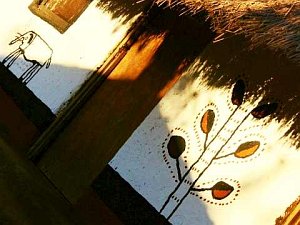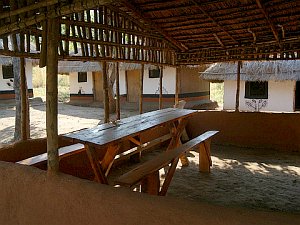Medical Matters
It is very important to plan well in advance before you
travel to any foreign country. We advise you to check up with
your dentist and your doctor. It is advisable to organize
spare contact lenses, glasses (bring a spare pair or bring
your prescription with you), get a first aid and medical kit
together and arrange all vaccinations.
It is recommended to bring basic items such as plasters,
bandages, pain killers etc. Plus malaria tablets
MUST be taken while here. If you need any
other personal medicine bring enough supplies along. Thuma is
approx 1 hour from the nearest hospital. Medical insurance is
required (proof to be shown before bookings can be
taken).
Ensure your insurance plan covers you for your trip and
the plan will make payments directly to providers or will
reimburse you later for overseas expenditure. Also make sure
you are covered for emergency medical transport if required
by air and with medical attendance.
Vaccinations recommended: (this is standard
recommendations for Africa)
Diphtheria, Tetanus, Measles, Mumps, Polio, Hepatitis A-B,
Yellow fever, Rabies, Typhoid (Check this with your local
Travel Medical Centre.)
Medical Check List:
- Antibiotics - ie ciprofloxacin
- Antidiarrhoeal drugs
- Acetaminophen (paracetamol)
- Anti-inflammatory drugs - ibuprofen
- Antihistamines tablets and cream
- Antibacterial ointment
- Anti malarial pills
- Bandages, gauze
- Stomach upset tablets
- Scissors, safety pins, tweezers, pocket knife
- DEET - Insect repellent
- Permethrin
- Sun block
- Oral rehydration salts
- Iodine tablets for water purification
- Sterile needles, syringes
Clothing
A trip to Malawi is different than a trip to, for example,
the South of Europe.
Due to living in the bush it is best to bring clothes with
natural colours such as green, brown, grey (any camouflage
clothing also works well). Remember that everything you will
wear out in the bush on the patrols such as a backpack and
the raincoat should possibly also be in the same colours as
mentioned above.
Even if the temperature during daytime can be very high,
it is recommended to bring long-sleeved shirts and long loose
fitting trousers to protect you from mosquito and tsetse fly
bites in the evening.
Depending on how long you stay we suggest you bring:
- 2 long sleeve t-shirts
- 3 short sleeve t-shirts
- 2 long trousers
- 1 shorts
- Socks
- Swimming suit
- Towel
- Sleeping bag or silk sleeping bag
- Good strong hiking boots
- Water proof jacket (in rainy season)
- Fleece
- Hat
Other things to bring: head torch, batteries, books to
read, board games, flip flops.
Donations always gratefully received:
Information books about animals, trees, insects, flowers
in Malawi or southern Africa, tracking techniques, bush
craft, conservation (we are always looking for new books to
help us with education here with photos in them not
drawings), torches, rechargeable batteries, old t-shirts, old
mobile phones, tents, sleeping bags, socks, laces, trousers
clothes and hats for as donations for staff.
We play an important role in the local school who are
always looking for different coloured large marker pens,
colouring pencils, crayons, paint, copy books, paper,
rubbers, rulers, net ball, footballs, pencils, any
educational material, but this is not mandatory, it is only
if you want to.
Specific Tasks And Work
Specific tasks and work may depend on seasonal or other
circumstances, but include:
- Construction of accommodation
- General camp maintenance
- Car maintenance
- Shopping
- Surveys - animals - trees - birds - reptiles -
insects
- Inventory of crop damage caused by elephants in the
communities
- Road construction and maintenance
- Daily Patrols - anti poaching - removal of snares -
deforestation - charcoal burning
- Assisting the field manager with some administration
work
- Community interaction - Human-elephant conflict
etc.
- Household work such as preparing the meals or baking
bread
- Training scouts - educational activities -
entertainment
- Teaching some lessons in the local school
For people with specific skills and/or knowledge (i.e.
(conservation) education, botany, reptiles, amphibians,
insects etc.), we can put together a special assignment
Note: we hardly do any hands-on work with animals
(i.e.: animal health care, catch, release etc). However we do
have a number of wild animals around camp such as baboons,
hyrax, porcupine, and vervet monkeys
The Wildlife Action Group will try to meet the interest of
the volunteer as much as possible and suggestions from your
side are most welcome.
And, of course, there is plenty of time available to do
relaxing daytrip to Lake Malawi and/or into Lilongwe town
(transport is provided for free; any additional costs (i.e.
food and/or accommodation) are not included in the volunteer
fee).
Your stay
The preferred minimum duration of your stay in Thuma
should be 3 weeks; the maximum duration we can offer is 2
months.
The reservation for your stay as a volunteer is confirmed
when you e-mail the Wildlife Action Group a scan of your
flight ticket/documents and medical insurance.
The volunteers are welcomed in Lilongwe (International
Airport) and transferred to Thuma F.R. Piick up in Salima is
also possible.
You will stay in the base
camp (grass-huts, bush-toilet, bush-shower, fire place
for cooking, solar power, water from a natural spring) in the
Thuma Forest Reserve so at night you will enjoy the call of
the bush baby, the hyena and the night birds and hear the
breaking of trees when the elephants are passing the camp...,
in other words: the real bush experience!
Life in camp starts pretty early approx 7am in the
morning. There are a lot of activities that you can involve
yourself in and around the camp, but you will also have some
spare time to relax and learn the Malawi traditional board
games and enjoy the fantastic views from the top rock. There
is a natural rock pool that we use as our swimming pool
within 7 minutes walking from camp and is a welcome cooling
down place to visit especially in the dry season. Visitors
and volunteers are not permitted to wander outside of the
camp area alone at any time due to the chance of encounters
with our larger animals.









